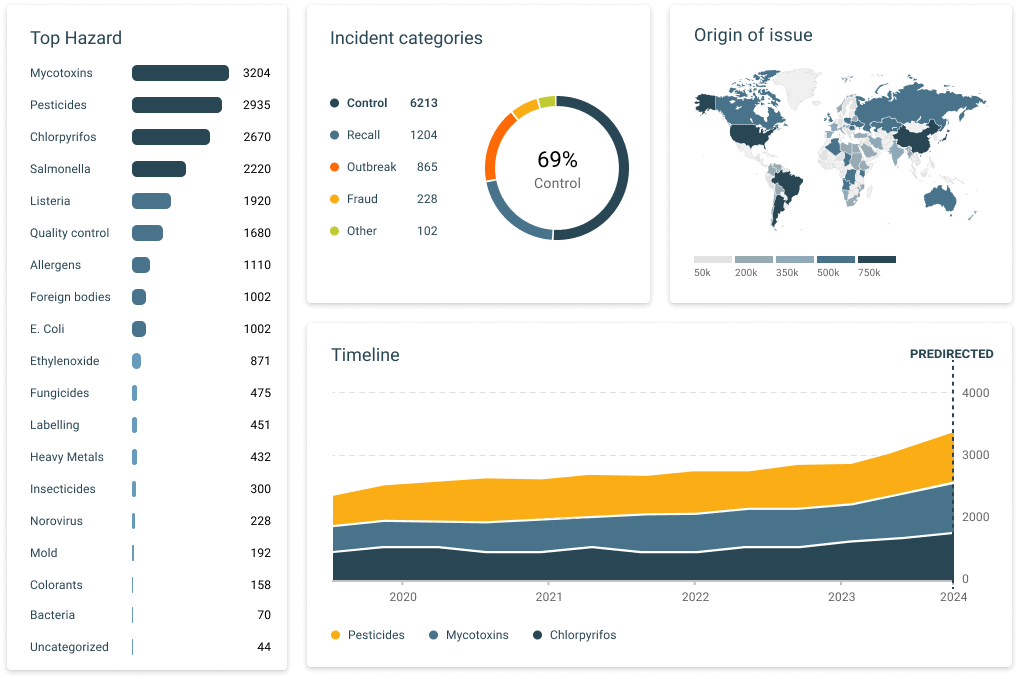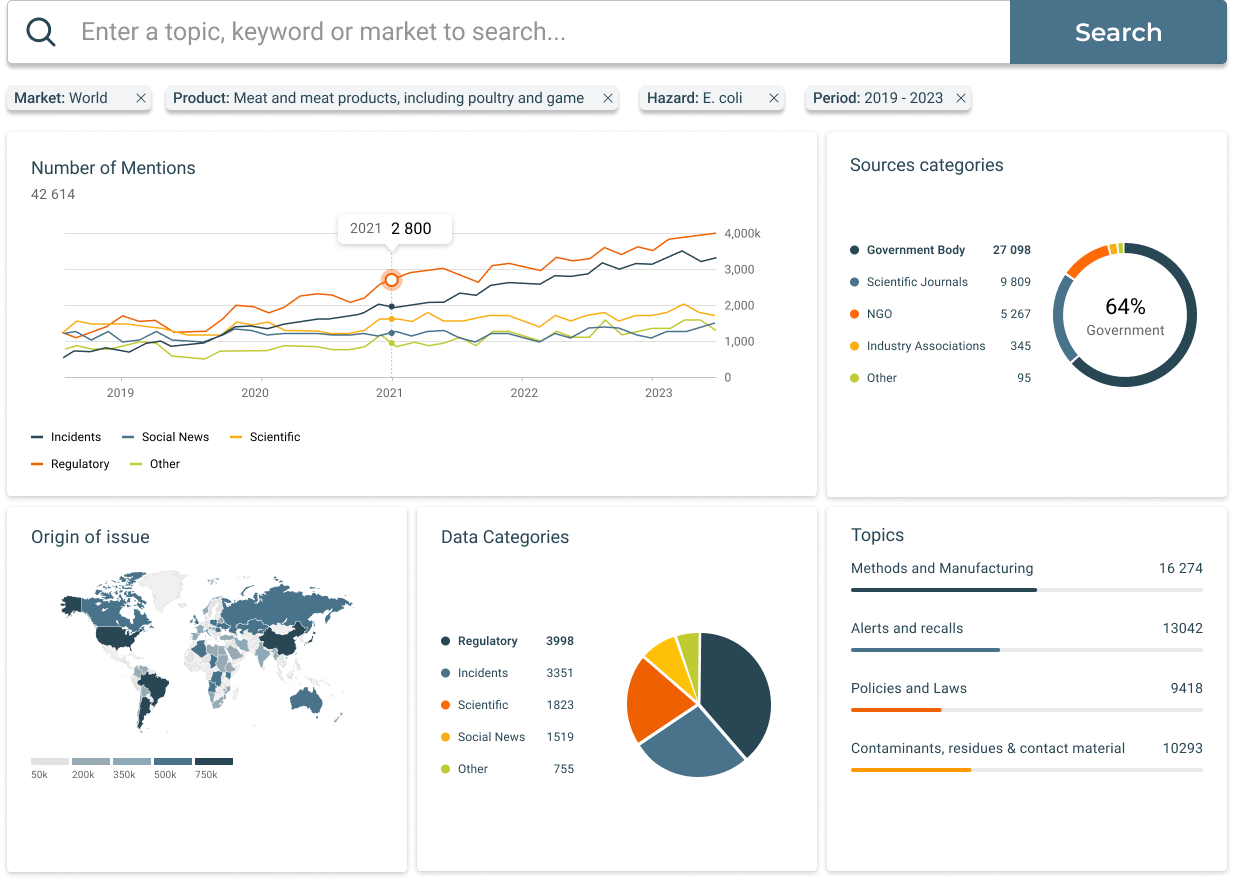Food fraud is an act that adulterates or mislabels food with economic interests, and its importance is grave enough to affect food safety worldwide and to destroy trust among consumers. Such activities include adulteration, substitution, mislabeling, and counterfeiting. Effective deterrent penalties in response to food fraud are essential to secure the food supply chain and assure public health. Legal frameworks and their efficacy in enforcement are some of the best ways to prevent fraudulent activities and ensure punitive measures are taken on the perpetrators. This paper focuses on the different penalties concerning food fraud and challenges in the law enforcement.
Legal Framework
Overview of International Food Fraud Laws
Food fraud is a global issue, and different countries have worked on regulatory frameworks to be better equipped to deal with food fraud. The legislation in place looks to ensure the safety of food, consumer protection, and market integrity. Here is an overview of the key regulations in major regions:
-
United States
- Food Safety Modernization Act (FSMA): Enforces preventive controls and enhanced inspection measures to ensure food safety and prevent fraud.
- Federal Food, Drug, and Cosmetic Act (FDCA): Prohibits the adulteration and misbranding of food products.
-
European Union
- General Food Law Regulation (EC 178/2002): Establishes principles and requirements of food law, including food safety and traceability.
- Food Fraud Network: Facilitates cooperation between member states in investigating and combating food fraud.
-
Asia
- China’s Food Safety Law: Implements strict regulations on food production, processing, and distribution to prevent fraud.
- Japan’s Food Labeling Law: Ensures accurate labeling of food products to prevent consumer deception.
Key Elements of Food Fraud Laws
- Traceability: Regulations require detailed tracking of food products throughout the supply chain to ensure transparency and accountability.
- Labeling Requirements: Laws mandate accurate labeling of ingredients, origin, and production methods to prevent misrepresentation.
- Inspection and Enforcement: Regulatory agencies conduct regular inspections and have the authority to enforce penalties for violations.
These legal frameworks provide a robust foundation for detecting and penalizing food fraud, ensuring that offenders face significant consequences for their actions.
Types of Penalties
The fraud against food can result in heavy penalties that are categorized in criminal, civil, and administrative actions. The penalties are in place to deter fraud activities and punish the wrongdoers.
Criminal Penalties
- Fines: Offenders may face substantial monetary fines. The amount varies depending on the severity and scale of the fraud. For example, in the United States, the FSMA allows for fines up to $500,000 for individuals and $1 million for corporations involved in food fraud.
- Imprisonment: Severe cases of food fraud can result in imprisonment. Sentences can range from a few months to several years, depending on the jurisdiction and the nature of the offense. For instance, individuals involved in the melamine-tainted milk scandal in China received prison sentences, with some even facing the death penalty due to the severity of the fraud and its impact on public health.
Civil Penalties
- Monetary Damages: Civil lawsuits can result in offenders being ordered to pay damages to affected parties, including consumers, businesses, and regulatory bodies. These damages compensate for financial losses, health impacts, and other harm caused by the fraud.
- Injunctions: Courts can issue injunctions to prevent further fraudulent activities. This can include stopping the production or distribution of fraudulent products and implementing corrective measures.
Administrative Penalties
- Licenses Revocation: Regulatory agencies can revoke licenses and permits of businesses found guilty of food fraud. This prevents them from operating within the industry.
- Product Recalls: Authorities can mandate the recall of fraudulent or unsafe products from the market. This protects consumers and maintains the integrity of the food supply chain.
By imposing these penalties, legal frameworks aim to create a strong deterrent against food fraud, ensuring that offenders face significant consequences for their actions.
Notable Cases and Penalties
1. Melamine Milk Scandal (China, 2008)
- Case Summary: In 2008, it was discovered that melamine, a toxic chemical, was added to infant formula and other dairy products in China to falsely boost protein content.
- Penalties: The scandal resulted in the deaths of six infants and illnesses in hundreds of thousands of children. Severe penalties were imposed, including prison sentences for those involved, with two individuals receiving the death penalty.
2. Horse Meat Scandal (Europe, 2013)
- Case Summary: In 2013, horse meat was found in products labeled as beef across Europe. The fraudulent labeling and substitution affected multiple countries and major food brands.
- Penalties: Companies involved faced hefty fines, product recalls, and reputational damage. Several executives were prosecuted and sentenced to prison for their roles in the fraud.
3. Peanut Corporation of America (PCA) Salmonella Outbreak (USA, 2009)
- Case Summary: PCA was responsible for a nationwide outbreak of salmonella due to contaminated peanut products, leading to nine deaths and over 700 illnesses.
- Penalties: The company's owner and executives were convicted on multiple felony counts, including conspiracy and fraud. They received significant prison sentences, with the owner sentenced to 28 years.
4. Olive Oil Adulteration (Italy, 2016)
- Case Summary: In 2016, several Italian olive oil companies were found guilty of selling adulterated olive oil, falsely labeled as extra virgin.
- Penalties: The companies faced substantial fines, product seizures, and reputational damage. Legal actions were taken against those responsible, including criminal charges.
These cases highlight the severe penalties imposed for food fraud, demonstrating the legal system’s commitment to protecting consumers and maintaining food safety standards.
Challenges in Enforcement
Global Supply Chains
The complexity and lack of transparency in global supply chains make it hard to trace and verify the authenticity of food products. Multiple intermediaries and varying standards across countries add to many layers through which fraudulent activities can easily pass undetected.
Regulatory Gaps
Inconsistent legislation on food fraud in various countries makes it difficult to enforce. The scams, therefore, capitalize on the existence of weak laws and areas that lack effective enforcement agencies. There is a need to harmonize international laws on food fraud that can facilitate the closure of these gaps.
Resource Constraints
Most of the regulatory agencies are usually constrained by many factors, such as lack of manpower and funds, which eventually makes them unable to conduct effective regular inspections and enforcement for laws related to food fraud. This enables some fraudulent acts to pass through unnoticed.
Technological Barriers
While technology can do a lot to help detect and prevent food fraud, challenges exist in using it. Advanced technologies that involve blockchain and AI require huge investments and expertise to develop and deploy, not at all feasible for every regulatory body or business.
Case Study: The Horse Meat Scandal
The 2013 horse meat scandal highlighted several enforcement challenges, including:
- Cross-border Complexity: The fraud spanned multiple countries, complicating coordination between regulatory bodies.
- Supply Chain Opacity: The lack of transparency in the supply chain made it difficult to trace the source of the fraud.
- Resource Limitations: Regulatory agencies struggled to keep up with the scale of the fraud due to limited resources.
Addressing these challenges requires international cooperation, investment in technology, and adequate resource allocation to regulatory agencies.
Role of Technology in Enforcement
Advanced technologies have made huge steps forward in the fight against food fraud, and SGS Digicomply leads the way in this sphere of innovation. From the use of AI to data analytics, SGS Digicomply provides end-to-end solutions to detect, report, and prevent food fraud.
Food Safety Intelligence Hub
The Food Safety Intelligence Hub is a powerful tool that consolidates global food safety data, enabling real-time monitoring and analysis. AI algorithms sift through vast amounts of data to identify patterns and anomalies that could indicate potential fraud. This proactive approach helps in early detection and mitigation of fraudulent activities, ensuring that food products are safe and authentic before they reach consumers. Watch demo.

Regulatory Intelligence Hub
The Regulatory Intelligence Hub ensures that businesses stay compliant with ever-changing food regulations across the globe. By continuously monitoring regulatory updates, this tool helps identify areas where there may be risks of non-compliance or opportunities for fraud. The AI-driven analysis provides insights into regulatory trends and helps businesses align their practices with current laws, thereby reducing the risk of fraudulent activities slipping through regulatory gaps. Watch demo.

Global Ingredient Monitor
Tracking the authenticity and quality of ingredients throughout the supply chain is crucial in combating food fraud. The Global Ingredient Monitor uses AI to analyze data from various points in the supply chain, detecting instances of adulteration or substitution. This tool provides detailed reports on ingredient integrity, helping businesses ensure that their products meet quality standards and are free from fraudulent modifications. Watch demo.

Horizon Scanning
Horizon Scanning is an innovative feature that uses AI to predict and identify emerging food fraud threats. By analyzing data from diverse global sources, including news, scientific publications, and social media, this tool provides early warnings about potential fraud risks. This proactive approach allows businesses and regulators to take preventive measures before fraud incidents become widespread, enhancing the overall integrity of the food supply chain. Watch demo.

Conclusion
SGS Digicomply's suite of AI-driven tools detects, reports, and prevents food fraud at a quite advanced level. Such tools provide real-time insights, regulatory updates, and predictive analytics, which can be very instrumental in the business world and for regulatory bodies charged with ensuring the safety and integrity of the food supply chain. Technology harnessed in this way will thus become indispensable in staying one step ahead of fraudsters to protect consumers.





.webp?width=1644&height=1254&name=Food%20Safety%20Dashboard%201%20(1).webp)
